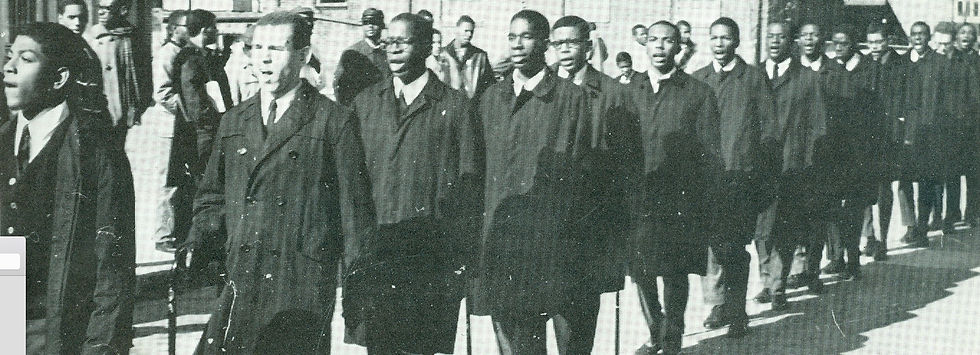Rev. Brother Ronald W. English (Fall 1963) Advanced The Gift Of Compromise To Finally Name A Street

(FYI: The Rev. Ronald W. English, of Charleston, West Virginia, was a Ministerial Assistant to Dr. Martin Luther King Jr., and offered the prayer at his funeral in 1968. Charleston, WV is probably the last city in the nation to name a street to honor Dr. Martin Luther King, Jr. The story behind the compromise reached concerning the name change revealed the power of collaboration to achieve a desired result.)
Background:
A resolution to name a street honoring Dr. King was passed unanimously by the City Council of Charleston, West Virginia on Monday, January 6, 2020. The initial proposal called for renaming Court Street, which had served as the epicenter of Justice and Governance since the city was founded, to be renamed Dr. Martin Luther King, Jr. Way sparked a controversy that proved to be an asset rather than a liability.

The compromise was approved in a collaborative meeting comprised of representatives from both sides of the controversy. While Charleston is the last among over 900 cities in the USA to honor Dr. King in this way, the process that produced it demonstrated the Gift of Compromise. The resolution passed in the first meeting of the City Council in 2020 also represents how 2020 vision from 2020 collaboration can produce significant results.
Commentary By The Rev. Ron English from Dec 28, 2019:
The word “compromise” often refers to a reluctant resolution to a difficult situation. In this sense, compromise is allied with concession as an agreement between conflicting parties which is closely monitored but shortly lived. However, a compromise created through collaborative conversations can serve as a teaching moment with a longer tenure.

This mode of compromise represents one recently presented to resolve a controversy that erupted over changing the name of Court Street to Dr. Martin Luther King Jr. Way. The initiators of the name change, attorney Kitty Dooley and City Councilwoman Jennifer Pharr, had worked out a compromise to keep the name Court Street and add Dr. Martin Luther King Jr. Way beneath it. They convened a meeting hosted by Deborah Weinstein at Charleston’s YWCA on the Sunday immediately before the compromise was to be presented to the City Planning Commission.
The group was comprised of representatives from faith-based organizations, community groups and individuals from both sides of the controversy. The purpose of the meeting was to engage the group’s support through a process of collaboration that heard and honored the perspectives of all participants.

At Ebenezer Baptist Church between the sons of MLK.JR, Dexter and MLK III, who carry a noble but heavy legacy.
Conversations to achieve this result revealed the core issue that energized the opposition was not that the name change honored Dr. King, but seemed to dishonor the personal and institutional sentiments associated with the story of Court Street. Conversations in such an open space often demonstrate the miracle of dialogue that strengthens connections and illuminates understanding among its participants.
Compromise gets complicated as a conflict resolution scheme when it is bound by binary “either/or” thinking that yields a middle ground agreement, at best. Conversations in an open space of “both/and” considerations often reveal a common ground resolution which is the gift of compromise. Compromise is a risky business, but it’s worth the risk.
Compromise is risky because it revolves around ideals held sacred by opposing sides. But the Israeli philosopher Avishai Margalit reminds us, “Ideals may tell us something important about what we would like to be; compromises tell us who we are.”

The poet sage Maya Angelou said, “When we know better we do better.” Hopefully, the collaborative conversations that prompted this compromise signify who we are and a zeal to become better.
Furthermore, the gift of compromise is a gift that will enhance the Court Street narrative. From the time Charleston was founded, Court Street has been the epicenter of justice. The compromise honors the work of Dr. King as the drum major for justice who embraced the belief that “the arc of the moral universe is long but it bends toward justice.’’

Finally, this compromise reveals an inconvenient truth of a displaced community in the Triangle District on the lower end of Court Street. The controversy provoked stories from the elders of the Triangle that still live in their hearts and minds despite the disruption in the Triangle.
The gift of compromise is a gift that keeps on giving. It honors the life and legacy of Martin Luther King Jr. and it enhances the peculiar pageantry of the Court Street narrative.
Might it be by Providential Design that the first national holiday we celebrate in the New Year is the birthday of a black Baptist preacher from the soul dust of the South, who constantly reminded us “the time is always right to do right?” Now is the time and Charleston is the place to do the right thing for the right cause and walk in King’s way.
















